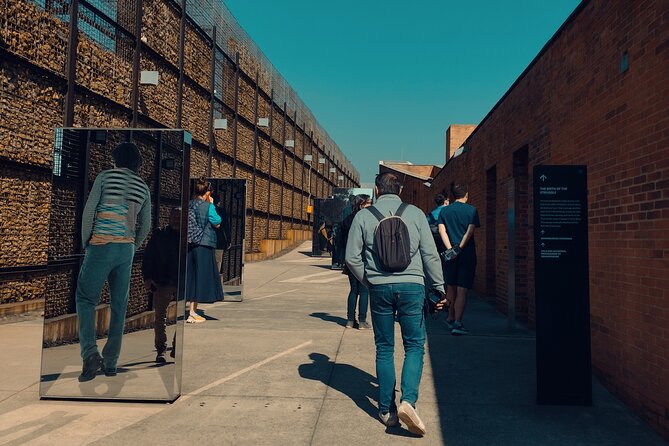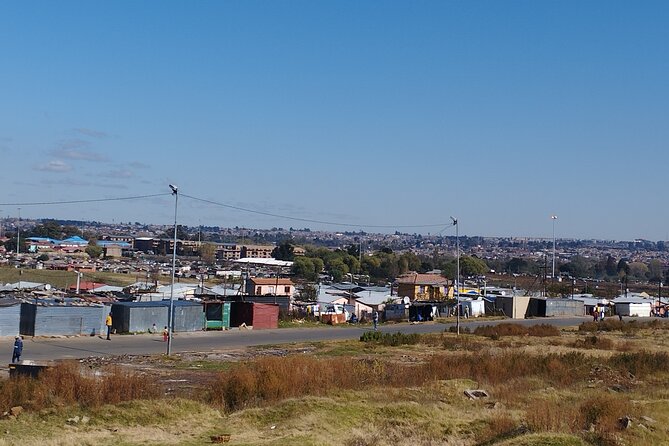Soweto, a vibrant township in South Africa, has long been a crucial site for understanding the nation’s complex history of apartheid. A visit to the Apartheid Museum nearby provides an immersive exploration of the racial injustices faced by the Black majority and the systematic oppression enforced by government laws. Through powerful exhibits and personal testimonies, visitors gain insight into the resilience of those who fought for equality, uncovering both the hardships endured and the remarkable progress made towards a more inclusive society. What secrets does Soweto hold, and how does the Apartheid Museum shed light on this pivotal chapter in South Africa’s past?
Key Points
• The tour provides a full-day exploration of Soweto township and the Apartheid Museum, focusing on South Africa’s history of racial injustice.
• The Apartheid Museum chronicles the human toll and collective struggle for justice, highlighting the fight for equality and reconciliation post-apartheid.
• The tour explores the racial injustices faced by South Africa’s Black majority, including the systematic denial of basic rights and the creation of a segregated society.
• The tour provides insights into the sharp divisions within communities during the apartheid era, examining the complex factors contributing to economic disparities.
• The tour highlights the progress made in dismantling legal racial segregation and promoting diversity, as well as the ongoing efforts to shape a more equitable future.
Tour Overview

The tour offers a full-day exploration of Soweto township and the Apartheid Museum, providing an immersive look into South Africa’s complex history of racial injustice and the emergence of the ‘rainbow nation.’
Guests will embark on a guided journey, learning about the apartheid era and its lasting impact on the country’s social, economic, and political landscape.
The experience focuses on themes of racial division, community resilience, and the fight for equality, with visits to significant sites like Nelson Mandela’s former home.
Throughout the day, travelers will have the chance to interact with locals, gaining a deeper understanding of Soweto’s vibrant culture and the ongoing transformation of South Africa.
Ready for more culture? More museums we feature in Johannesburg
Apartheid Era History
Apartheid, a ruthless system of racial segregation and oppression, cast a dark shadow over South Africa’s history for decades, deeply dividing the nation along racial lines and denying fundamental rights to the country’s Black majority.
This shameful era saw the institutionalization of white supremacy, with the government enforcing harsh laws that restricted the movement, education, and economic opportunities of non-white citizens.
The Apartheid Museum masterfully chronicles this period, allowing visitors to gain a powerful understanding of the human toll and collective struggle for justice.
Through interactive exhibits and personal testimonies, the museum illuminates the resilience and heroism of those who fought tirelessly to dismantle the oppressive system and usher in a new era of equality and reconciliation.
Racial Injustice Explored

At the heart of the Apartheid Museum’s powerful exhibits lies a profound exploration of the racial injustices that tore South Africa apart, robbing generations of their basic rights and human dignity. Visitors are confronted with the stark realities of a system that institutionalized discrimination, denying the country’s Black majority access to quality education, economic opportunities, and even the freedom to live where they chose. Through immersive displays and personal testimonies, the museum captures the lived experiences of those who endured the indignities and violence of the apartheid era, painting a harrowing picture of the deep-rooted prejudices and systemic barriers that permeated every facet of society.
| Denied Freedoms | Lack of Opportunity | Segregated Society |
|---|---|---|
| Freedom of Movement | Economic Marginalization | Separate Amenities |
| Freedom of Association | Educational Inequity | Restricted Residences |
| Political Disenfranchisement | Employment Discrimination | Enforced Racial Divisions |
Community Division Insights
Profound divisions within South African communities came into sharp focus during the apartheid era, with legislated racial segregation and discriminatory policies erecting formidable barriers between the nation’s diverse populations.
Visitors to Soweto, the epicenter of the anti-apartheid struggle, gain invaluable firsthand insights into how these divisive forces manifested in the lived experiences of ordinary citizens, from unequal access to basic services and amenities to the social isolation enforced by the apartheid regime.
The tour explores the legacy of these divisions, examining how communities were pitted against one another and the long-lasting impact on the social and economic fabric of the township.
Engaging with local residents provides a deeply personal understanding of the hardships endured and the resilience that ultimately paved the way for a more united ‘rainbow nation.’
Economic Classes Examined

Visitors exploring Soweto’s vibrant neighborhoods can’t help but notice the striking disparities in economic status, as gleaming modern homes stand in stark contrast to the cramped, makeshift dwellings that characterize many parts of the township.
The tour delves into the complex factors that gave rise to these divisions, from the systemic oppression of the apartheid era to the ongoing challenges of wealth inequality and limited economic mobility.
Guests learn how the scars of the past continue to shape the present, even as Soweto’s residents work to rebuild their community and create new opportunities for all.
The experience offers a nuanced perspective on the intersections of race, class, and power that define South Africa’s social landscape.
Emergence of Rainbow Nation
Amidst the complex socioeconomic dynamics uncovered through the Soweto tour, glimmers of hope emerge as the nation grapples with its apartheid past and embraces the vision of a united, multiracial ‘rainbow nation.’
The transition to democracy in the 1990s ushered in a new era, with leaders like Nelson Mandela championing reconciliation and inclusive nation-building.
Though challenges persist, the country has made strides in dismantling legal racial segregation, promoting diversity, and creating opportunities for marginalized communities.
The tour of Soweto offers a glimpse into this evolving landscape, where residents are redefining their identities and working to heal the wounds of the past, all while shaping a more equitable future for South Africa.
Tour Personalization Features
A key feature of the Soweto and Apartheid Museum tour is its personalization, allowing guests to enjoy a private experience tailored to their specific interests and needs.
The tour is led by accredited, professional guides who are knowledgeable and passionate about the history and culture of South Africa.
With onboard Wi-Fi, guests can stay connected throughout the journey, enhancing their understanding and engagement.
Accessibility is also a priority, with the tour being wheelchair and stroller accessible, and infant seats available.
This personalized approach ensures that each guest can fully enjoy the powerful stories and experiences that the tour has to offer, creating a truly memorable and impactful visit.
Booking and Accessibility
The tour’s booking process offers guests convenient flexibility, with prices starting at ₦8,871.42 and the option to cancel up to 24 hours before the experience. Accessibility is a key priority, ensuring the tour is wheelchair and stroller accessible, with infant seats available to accommodate diverse needs and abilities.
| Booking Information | |
|---|---|
| Price | Starts at ₦8,871.42, varies by group size |
| Cancellation Policy | Free cancellation up to 24 hours before the experience starts |
| Confirmation | Received at time of booking |
| Accessibility | Wheelchair and stroller accessible, infant seats available |
Frequently Asked Questions
How Accessible Is the Tour for Individuals With Disabilities?
The tour is highly accessible, with an air-conditioned, wheelchair-accessible vehicle, and accommodations for guests with disabilities, including infant seats. The Apartheid Museum and Soweto sites are also wheelchair and stroller friendly, ensuring a comfortable experience for all.
What Is the Average Group Size for the Private Tour Experience?
The private tour experience typically has a small group size, allowing for a more personalized and intimate exploration of the sights. The tour operator aims to keep the group size manageable, usually capping it at 10-15 participants.
Are There Any Discounts or Promotions Available for the Tour?
The tour operator occasionally offers discounts or promotions for the private tour experience, such as group booking discounts or early booking incentives. Customers should check the operator’s website or inquire directly for the latest special offers.
Can the Tour Be Customized to Focus on Specific Areas of Interest?
Yes, the tour can be customized to focus on specific areas of interest. The private nature of the tour allows guests to tailor the experience to their preferences, ensuring they explore the topics most important to them.
What Is the Recommended Duration of the Soweto Tour Portion?
The recommended duration of the Soweto tour portion is generally 2-3 hours. This allows visitors ample time to explore the vibrant township, interact with locals, and gain a comprehensive understanding of the community’s history and culture.
Recap
The Apartheid Museum offers a powerful and immersive look into Soweto’s history, providing visitors with a deeper understanding of the racial injustices and systematic oppression that shaped South Africa.
Through personal testimonies and thought-provoking exhibits, the museum highlights the resilience of those who fought for equality, and the progress made towards a more inclusive society.
Exploring Soweto and the Apartheid Museum is a profound and essential experience for understanding this complex and transformative chapter in the nation’s history.
More Museum Experiences in Johannesburg
More Tour Reviews in Johannesburg
Not for you? Here's more things to do in Johannesburg we have recnetly reviewed
- Innercity Walking Tour
- Airport Transfers Johannesburg
- Private Half Day Authentic Soweto Tour From Johannesburg or Pretoria
- Full-Day Soweto, Apartheid Museum and Lunch Tour
- Cradle of Humankind World Heritage Site
- Soweto /Johannesburg and Apartheid Museum Guided Full Day Tour
- Lesedi Cultural Village & Cradle of Humankind Guided Tour
- Unique Street Food Tour From at Least 6 Different Cultures!
- 3-Day Kruger National Park Safari Including Breakfast and Dinner
- Lesedi Cultural Village
- Cradle of Human Kind Tour – Maropeng and Wondercave Tour
- Cradle of Human Kind Tour and Lesedi Cultural Village Day Tour
